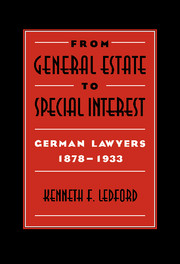Book contents
- Frontmatter
- Contents
- List of Illustrations
- Hierarchy of Courts
- Glossary of Legal and Other Terms
- Abbreviations
- Preface
- 1 The Archimedean Point: Lawyers, Liberalism, and the Middle-Class Project
- 2 Freie Advokatur: The Blending of the Middle-Class and Professional Projects
- 3 Foundation of the Modern Profession: The Private Bar under the Lawyers' Statute
- 4 Institutional Framework: Lawyers and Honoratiorenpolitik
- 5 Growth and Diversification: Lawyers in the Province of Hannover, 1878–1933
- 6 Elites and Professional Ideology: Self-Discipline and Self-Administration by the Anwaltskammer Celle
- 7 Simultaneous Admission: The Limits of Honoratiorenpolitik
- 8 The Limits of Economic Liberalism: Freie Advokatur or Numerus Clausus?
- 9 The Limits of Political Liberalism: Lawyers and the Weimar State
- 10 Conclusion: Lawyers and the Limits of Liberalism
- Methodological Appendix
- Bibliography
- Index
8 - The Limits of Economic Liberalism: Freie Advokatur or Numerus Clausus?
Published online by Cambridge University Press: 11 September 2009
- Frontmatter
- Contents
- List of Illustrations
- Hierarchy of Courts
- Glossary of Legal and Other Terms
- Abbreviations
- Preface
- 1 The Archimedean Point: Lawyers, Liberalism, and the Middle-Class Project
- 2 Freie Advokatur: The Blending of the Middle-Class and Professional Projects
- 3 Foundation of the Modern Profession: The Private Bar under the Lawyers' Statute
- 4 Institutional Framework: Lawyers and Honoratiorenpolitik
- 5 Growth and Diversification: Lawyers in the Province of Hannover, 1878–1933
- 6 Elites and Professional Ideology: Self-Discipline and Self-Administration by the Anwaltskammer Celle
- 7 Simultaneous Admission: The Limits of Honoratiorenpolitik
- 8 The Limits of Economic Liberalism: Freie Advokatur or Numerus Clausus?
- 9 The Limits of Political Liberalism: Lawyers and the Weimar State
- 10 Conclusion: Lawyers and the Limits of Liberalism
- Methodological Appendix
- Bibliography
- Index
Summary
The internal professional conflict that surrounded the issue of simultaneous admission overlay yet another cleavage that crystallized around calls to reimpose limitations upon admission to the bar, specifically around a movement to reestablish strict limits on the number of lawyers, a numerus clausus. The lawyer-notables who controlled the DAV tenaciously defended a strict conception of freie Advokatur until December 1932, rejecting a numerus clausus out of hand as the road back to state tutelage. Younger, more marginal practitioners in large cities and in small towns increasingly clamored for relief from what they experienced as “proletarianization” during the 1920s and early 1930s, and they came to view the leaders of the bar, who defended freie Advokatur so stubbornly, as part of the cause of their misery. Leaders of the provincial lawyers' chambers reflected this conflict but in general defended freie Advokatur and opposed the numerus clausus. When the representatives' assembly of the DAV endorsed a numerus clausus in December 1932, the lawyer-notables finally admitted that the bar had reached the limits of economic liberalism. Professional ideology and structure offered no other solution than to retreat from the freie Advokatur that had formed the basis of the bar's identity since the 1860s. The debate about freie Advokatur and numerus clausus revealed yet again the weakness of professional Honoratiorenpolitik and the insufficiency of procedural solutions to respond to structural economic hardship, and in so doing contributed to the unmasking of the bar as a special interest rather than the general estate.
- Type
- Chapter
- Information
- From General Estate to Special InterestGerman Lawyers 1878–1933, pp. 245 - 274Publisher: Cambridge University PressPrint publication year: 1996



